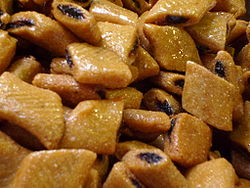
Summary
Makroudh (Arabic: مقروض, romanized: maqrūḍ), also spelled Makrout, is a cookie from the cuisine of the Maghreb. It is filled with dates and nuts or almond paste, that has a diamond shape – the name derives from this characteristic shape.
 Makroudh covered in honey | |
| Type | Cookie |
|---|---|
| Place of origin | Maghreb |
| Main ingredients | Semolina, dates or figs |
| |
The dough is made with a combination of semolina and flour, which gives the pastry a very specific texture and flavor. Makroudh can be fried in oil or oven-baked.[1]
It is popular in the Maghreb where there are many varieties of Makroudh, some of which are pastries that do not share much in common with the traditional Makroudh except the shape.[2][3] In Algeria, they may be filled with almond paste.[4]
Makroudh with dates and honey is also popular during Eid al-Fitr.[5]
Preparation edit
Makroudh is prepared by filling a dough made with semolina, usually using the Deglet Nour date variety. The dough is then rolled and cut into diamond-shaped pieces. The pastry is then either fried or oven-baked. The final step involves soaking the makroudh in a sweet syrup.[6]
See also edit
References edit
- ^ Gaelle & Patrice Le Franc. "Makroudh". La Cuisinede Ma Copine. Archived from the original on 2012-07-08. Retrieved 2014-04-09.
- ^ "Makrout el louz - Les Joyaux de Sherazade". Les Joyaux de Sherazade (in French). 2015-07-16. Retrieved 2017-06-19.
- ^ "Recette pour ramadan facile / Makrout salé". Les Joyaux de Sherazade (in French). 2014-05-29. Retrieved 2017-06-19.
- ^ Marks, Gil (2010-11-17). Encyclopedia of Jewish Food. Houghton Mifflin Harcourt. ISBN 978-0544186316.
- ^ Jacob, Jeanne; Ashkenazi, Michael (2014). The World Cookbook: The Greatest Recipes from Around the Globe. ABC-CLIO.
- ^ "North African Cuisine". www.foodingredientsonline.com. Retrieved 2018-02-05.


